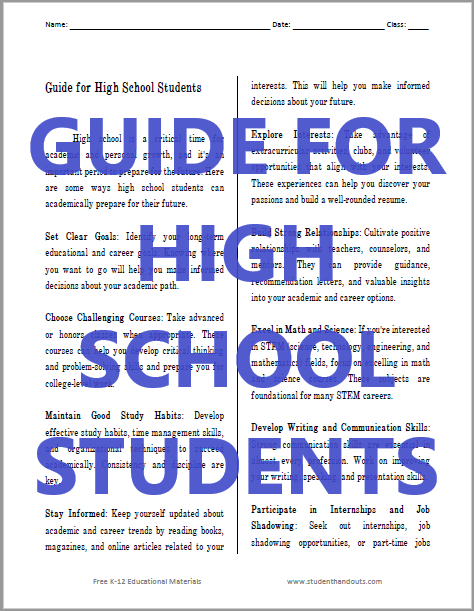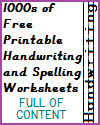| Guide for High School Students |
| www.studenthandouts.com > Miscellaneous > Guide for High School Students |
|---|
|
High school is a critical time for academic and personal growth, and it's an important period to prepare for the future. Here are some ways high school students can academically prepare for their future.
Set Clear Goals: Identify your long-term educational and career goals. Knowing where you want to go will help you make informed decisions about your academic path. Choose Challenging Courses: Take advanced or honors classes when appropriate. These courses can help you develop critical thinking and problem-solving skills and prepare you for college-level work.  Maintain Good Study Habits: Develop effective study habits, time management skills, and organizational techniques to succeed academically. Consistency and discipline are key.
Maintain Good Study Habits: Develop effective study habits, time management skills, and organizational techniques to succeed academically. Consistency and discipline are key. Stay Informed: Keep yourself updated about academic and career trends by reading books, magazines, and online articles related to your interests. This will help you make informed decisions about your future. Explore Interests: Take advantage of extracurricular activities, clubs, and volunteer opportunities that align with your interests. These experiences can help you discover your passions and build a well-rounded resume. Build Strong Relationships: Cultivate positive relationships with teachers, counselors, and mentors. They can provide guidance, recommendation letters, and valuable insights into your academic and career options. Excel in Math and Science: If you're interested in STEM (science, technology, engineering, and mathematics) fields, focus on excelling in math and science courses. These subjects are foundational for many STEM careers. Develop Writing and Communication Skills: Strong communication skills are essential in almost every profession. Work on improving your writing, speaking, and presentation skills. Participate in Internships and Job Shadowing: Seek out internships, job shadowing opportunities, or part-time jobs related to your intended career field. Practical experience can help you understand the real-world applications of your studies. Prepare for Standardized Tests: Depending on your future plans, you may need to take standardized tests like the SAT or ACT for college admissions. Invest time in test preparation and consider taking practice exams. Research College and Career Options: Begin researching colleges, universities, and vocational programs that align with your goals. Explore different majors and career paths to find the best fit for you. Financial Literacy: Learn about financial management, budgeting, and the cost of higher education. Understanding your financial options and responsibilities is crucial for your future. Stay Informed About Scholarships: Research scholarships and grants to help fund your education. Many organizations and institutions offer scholarships based on academic achievement, talents, and interests. Seek Guidance and Counseling: Consult with your school's guidance counselor or a career counselor to create a personalized academic and career plan. They can provide valuable insights and resources. Develop a Growth Mindset: Embrace challenges and setbacks as opportunities for growth. A growth mindset can help you persevere through academic challenges and setbacks. Network: Build a network of peers, mentors, and professionals in your field of interest. Networking can open doors to internships, job opportunities, and valuable advice. Practice Self-Care: Maintain a healthy balance between academics, extracurricular activities, and personal well-being. Prioritize self-care to reduce stress and maintain mental and physical health. Remember that academic preparation is just one aspect of preparing for the future. Developing soft skills such as adaptability, problem-solving, teamwork, and resilience is equally important for success in college and your future career. Continuously assess your goals and adjust your academic and personal development strategies as needed to stay on the path to achieving your dreams. Click here to print this above guide for students (PDF file). |
 Each state–even each district within a state–has its own set of requirements for a high school diploma. Many states also require that students pass a proficiency examination. To find therequirements for your area, try internet searches such as "Montana Board of Education."
Each state–even each district within a state–has its own set of requirements for a high school diploma. Many states also require that students pass a proficiency examination. To find therequirements for your area, try internet searches such as "Montana Board of Education."A school district website may display a chart like this (chart on the right): The “credits” typically translate into "years." In the example above, the student must complete three years of English (English I, II, and III), a semester (half-year) of Health, two years of math, etc., in order to earn a basic high school diploma. "Electives" are courses that you get to pick–drama, music, painting, etc. Remember that these required courses are for a basic high school diploma and will not, on their own, necessarily gain you admittance into college. State universities and community colleges which accept students who have taken only these basic courses will require remedial coursework. This means that if you don’t take it in high school, you have to take it in college. High school classes are basically free and usually easier than their college versions. The question then is, "Should I take a third or fourth year of math for free as a high school student, or pay $100-$2500 to take a required math course in college?" To avoid remedial college classes, and to get into a more exclusive university, a student should follow the college preparatory ("college prep") curriculum. This basically amounts to four years of all core subjects–English, math, science, and social studies–along with numerous electives, often with a focus on a certain area of student interest. A college-bound student should take at least two years of a foreign language and a fine arts course (such as painting or general art). |
 |  |  |  |
| www.studenthandouts.com > Miscellaneous > Guide for High School Students |
|---|






